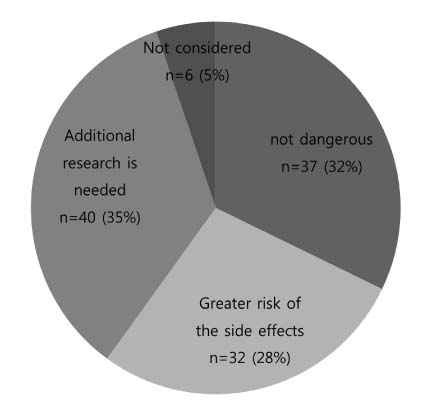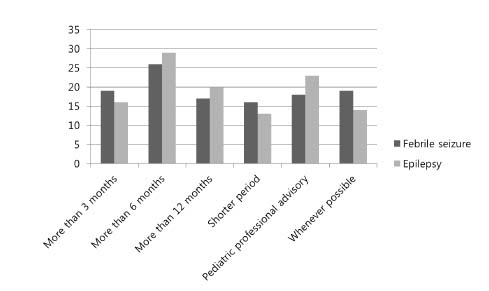Korean J healthc assoc Infect Control Prev.
2018 Jun;23(1):8-13. 10.14192/kjhaicp.2018.23.1.8.
Survey of Pediatricians' Perceptions on the Vaccination of Children with History of Febrile Seizures and Epilepsy
- Affiliations
-
- 1Department of Pediatrics, Daedong Hospital, Busan, Korea. furanken@naver.com
- KMID: 2414498
- DOI: http://doi.org/10.14192/kjhaicp.2018.23.1.8
Abstract
- BACKGROUND
Some pediatricians have been reported to be reluctant to vaccinate children with a history of febrile seizures and epilepsy. Pediatricians should conduct an investigation regarding the degree of implementation and need for preventive vaccination in children with history of febrile seizures and epilepsy and the incidence of side effects that actually occur to evaluate the penetration rate needed for children with a history of seizures in the country.
METHODS
The survey was conducted using a questionnaire sent to 326 members of the Pusan Pediatrics Society. The survey was conducted from March to June 2016. A total of 115 responses were received.
RESULTS
Of 115 members, 72 (62.6%) vaccinated children with a history of febrile seizures and epilepsy, 98 (85.2%) responded positively to the need for vaccination for these children, and 79 (68.6%) were unsure of its safety. When asked what was the sufficient monitoring time needed before vaccinating since the last seizure or well-controlled epilepsy, 26 (22.6%) and 29 members (25.2%) responded more than 6 months, which was the most common answer in both cases.
CONCLUSION
Establishing a guideline for the appropriate monitoring period and indication of vaccination in children with history of febrile seizures and epilepsy is required to reassure pediatricians and patients about the vaccination.
Keyword
Figure
Reference
-
1. Pruna D, Balestri P, Zamponi N, Grosso S, Gobbi G, Romeo A, et al. Epilepsy and vaccinations: Italian guidelines. Epilepsia. 2013; 54:Suppl 7. 13–22.
Article2. Tanabe T, Tagawa T, Arai H, Imaishi H, Uno R, Tanaka J, et al. Survey of Japanese pediatricians on vaccination of children with neurological disorders. Pediatr Int. 2011; 53:626–629.
Article3. Gkampeta A, Pavlidou E, Pavlou E. Vaccination and neurological disorders. J Pediatr Sci. 2015; 7:e237.
Article4. Tanabe T, Nishimura T, Kurose H, Yamazaki T, Maki I, Imakita Y, et al. A questionnaire survey on vaccination of children with febrile seizures, epilepsy and severe psychomotor handicaps. J Japan Pediatr Soc. 2014; 118:917–922.5. Tanabe T, Awaya Y, Matsuishi T, Nagai T, Yamamoto K, Kurihara M, et al. Survey of vaccination and viral infections for children with severe myoclonic epilepsy in infancy. No To Hattatsu. 2004; 36:318–323.6. The Korean Pediatric Society. Immunization guideline. 8th ed. Seoul: The Korean Pediatric Society;2015. p. 1–303.7. Kohl KS, Marcy SM, Blum M, Connell Jones M, Dagan R, Hansen J, et al. Fever after immunization: current concepts and improved future scientific understanding. Clin Infect Dis. 2004; 39:389–394.
Article8. Principi N, Esposito S. Vaccines and febrile seizures. Expert Rev Vaccines. 2013; 12:885–892.
Article9. Brown NJ, Berkovic SF, Scheffer IE. Vaccination, seizures and ‘vaccine damage’. Curr Opin Neurol. 2007; 20:181–187.
Article10. Pollock TM, Miller E, Mortimer JY, Smith G. Symptoms after primary immunisation with DTP and with DT vaccine. Lancet. 1984; 2:146–149.
Article11. Blumberg DA, Lewis K, Mink CM, Christenson PD, Chatfield P, Cherry JD. Severe reactions associated with diphtheria-tetanus-pertussis vaccine: detailed study of children with seizures, hypotonic-hyporesponsive episodes, high fevers, and persistent crying. Pediatrics. 1993; 91:1158–1165.
Article12. Annegers JF, Hauser WA, Shirts SB, Kurland LT. Factors prognostic of unprovoked seizures after febrile convulsions. N Engl J Med. 1987; 316:493–498.
Article13. Barlow WE, Davis RL, Glasser JW, Rhodes PH, Thompson RS, Mullooly JP, et al. The risk of seizures after receipt of whole-cell pertussis or measles, mumps, and rubella vaccine. N Engl J Med. 2001; 345:656–661.
Article14. Sun Y, Christensen J, Hviid A, Li J, Vedsted P, Olsen J, et al. Risk of febrile seizures and epilepsy after vaccination with diphtheria, tetanus, acellular pertussis, inactivated poliovirus, and Haemophilus influenzae type B. JAMA. 2012; 307:823–831.
Article15. Huang WT, Gargiullo PM, Broder KR, Weintraub ES, Iskander JK, Klein NP, et al. Lack of association between acellular pertussis vaccine and seizures in early childhood. Pediatrics. 2010; 126:263–269.
Article16. Andrews N, Stowe J, Wise L, Miller E. Post-licensure comparison of the safety profile of diphtheria/tetanus/whole cell pertussis/haemophilus influenza type b vaccine and a 5-in-1 diphtheria/tetanus/acellular pertussis/haemophilus influenza type b/polio vaccine in the United Kingdom. Vaccine. 2010; 28:7215–7220.
Article17. Klein NP, Fireman B, Yih WK, Lewis E, Kulldorff M, Ray P, et al. Measles-mumps-rubella-varicella combination vaccine and the risk of febrile seizures. Pediatrics. 2010; 126:e1–e8.
Article18. Duffy J, Weintraub E, Hambidge SJ, Jackson LA, Kharbanda EO, Klein NP, et al. Febrile seizure risk after vaccination in children 6 to 23 months. Pediatrics. 2016; 138:e20160320.
Article19. Tanabe T, Awaya Y, Matsuishi T, Iyoda K, Nagai T, Kurihara M, et al. Management of and prophylaxis against status epilepticus in children with severe myoclonic epilepsy in infancy (SMEI; Dravet syndrome)--a nationwide questionnaire survey in Japan. Brain Dev. 2008; 30:629–635.
Article
- Full Text Links
- Actions
-
Cited
- CITED
-
- Close
- Share
- Similar articles
-
- Unprovoked Seizures in Children with Febrile Seizures
- Epilepsy in children with a history of febrile seizures
- Selection of High Risk Group According to Risk Factors of Recurrent Febrile Seizures
- Recurrence Rate of Febrile Seizures by Combining Risk Factors
- Ischemic Encephalothy Found Accidentally in Children Diagnosed as Febrile Seizures




